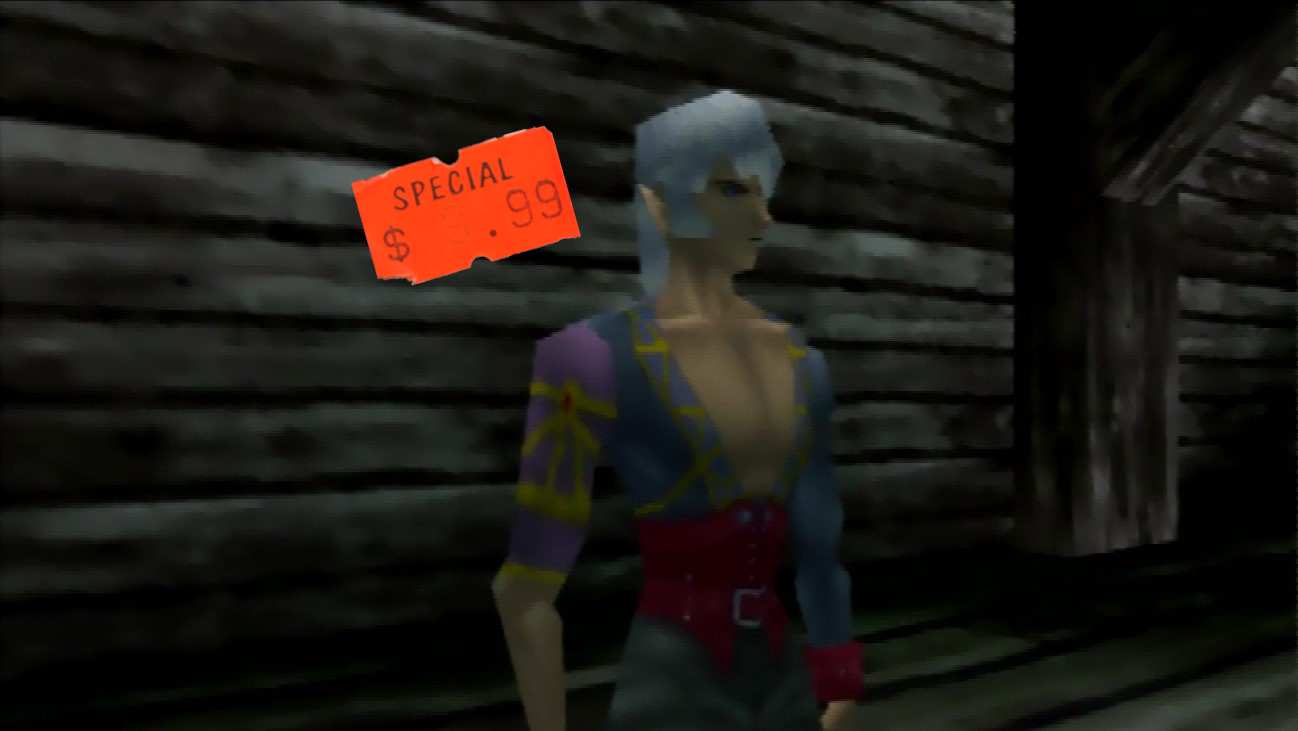Worthwhile-est game award
Last time at the Destructoid Institute of Critiquing Kusoge, I looked at Castlevania for the N64. We’ve established that the Castlevania series has never been very good when it comes to its 3D titles, but the N64 games are likely the most worthwhile.
The second title on the N64, Castlevania: Legacy of Darkness, is easily the worthwhile-est. That’s mostly because it’s essentially an apology for Castlevania 64. Love it or hate it, it’s hard to deny that Castlevania 64 had the signs of rushed development. This wasn’t anything overly major – most of its glaring problems today aren’t atypical for the time period it was released – but it comes down to a lack of polish. More notably, but less noticeably, Konami cut two characters of the planned four.
Legacy of Darkness reimplements one of these characters, adds a new one, then takes a polishing brush to the quests of the previous iteration’s main quests. The result is a title that’s perhaps closer to the developer’s original vision. However, it’s still the same game at its bones, with a lot of its content taken directly from Castlevania 64. If you played that one, it’ll be hard to sell you on Legacy of Darkness, and harder still if you, understandably, didn’t enjoy that game.
For me, however, this is the current apex of the 3D Castlevania mashed potato heap.
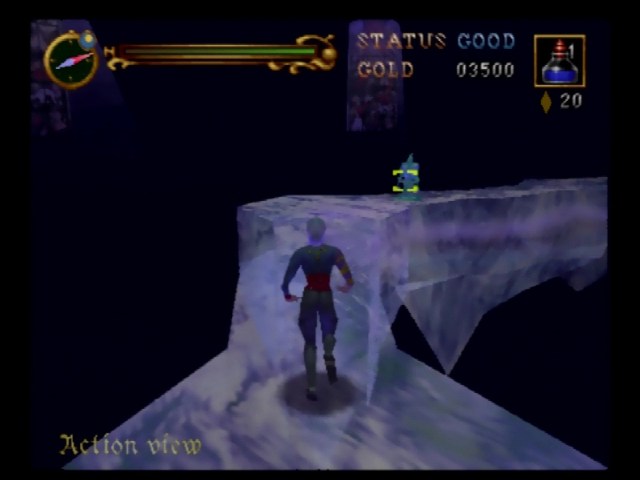
Extra pixels
Let’s start where Legacy of Darkness does: selecting your resolution. Expansion pack owners may turn on the special, VIP-only “High” mode. Like most N64 high-resolution modes, this definitely does have an impact on the game’s visual quality. There’s really no getting past the N64’s aggressive blurriness, but shoving in some extra pixels does help.
However, I wouldn’t recommend it. I played through the entirety of the prologue quest with it on, and there were moments when my N64 practically let out an audible “hrrrrng” as it strained to lift the weight of everything happening on screen. When playing on the N64, bad framerate is a rule rather than an exception, but high-resolution Legacy of Darkness likes to get particularly choppy at inopportune times. When it starts dropping frames, it’s usually during moments of precise platforming.
There was one moment in the “Tower of Execution” level of the game where there was an obstacle that, by all rights, should have been easy for me to overcome. However, because it would turn into a slideshow whenever I got near it, it took me several attempts to finally get through.
For reference, any screenshot here depicting Cornell or Henry was done in high-resolution mode, while Reinhardt gets low-resolution. I captured these directly from my N64 and upscaled them through a Framemeister.
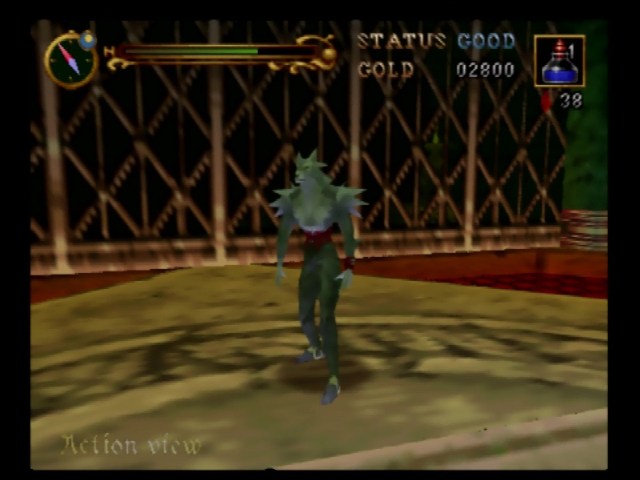
Blue Crescent Moon
When you begin with Legacy of Darkness, Cornell is your only playable character. Cut from the original release, there really isn’t enough dialogue in the game to make Cornell interesting. However, he’s a werewolf which, by default, makes him the most interesting protagonist in a Castlevania title.
His adventure takes place 8 years before Reinhardt and Carrie bring the fight to Dracula in Castlevania 64. His sister is abducted, so he delves into Dracula’s castle to get her back.
It’s largely the same Dracula’s castle we saw in the previous title. Many of the locations within are mostly the same as they were. Some of them are rejiggered versions of previous locations, and some of them are new. Even when Cornell is in a place from Reinhardt and Carrie’s adventure, he’s usually tackling it in a completely new way. However, it’s hard not to get some intense deja vu from playing it. It’s especially hard to ignore when Cornell is following the same dance steps in a familiar cutscene.
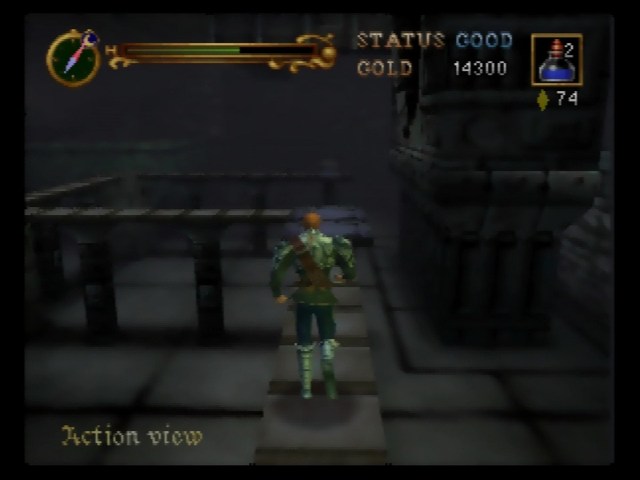
Fursona
Cornell isn’t that different than the other protagonists. The biggest difference is his extra ability where he expends all his accumulated gems to transform into a wolf (with the L button, bizarrely). Beyond just looking irresistible, this makes him briefly more powerful. As a note, you can’t just turn this off at will. You need to wait until all gems have been used up before it deactivates. On the plus side, if you’ve already killed everyone, you can just zoom in and admire Cornell’s fursona.
When you finish Cornell’s quest, it unlocks Henry, a character who Cornell saves within the game. Henry’s quest takes place right behind Reinhardt and Carrie’s, with his goal being to save 6 children scattered throughout the early stages of the game.
This is weird for a few reasons. The first is that Henry just has a gun. Forget whips and magic. Those are only good for moving horses and making rabbits appear. Henry mows through things with a six-shooter. It’s too bad he isn’t there to kill Dracula, because he’d probably have an easy time of it.
The strangest part about Henry is that he has to visit levels after the first fork in the path for other protagonists. At the end of the Mansion section, Cornell, Carrie, and Reinhardt all jump into a hole and travel to different levels. Henry first jumps into the hole for one level, warps back, then jumps back in to be taken to another one, repeating until all the children are saved. I can only assume that the hole leads to a slide that branches in various ways. Otherwise, it’s a magic hole.
Saving six children within seven days is an interesting concept, but in execution, it doesn’t live up to the promise.
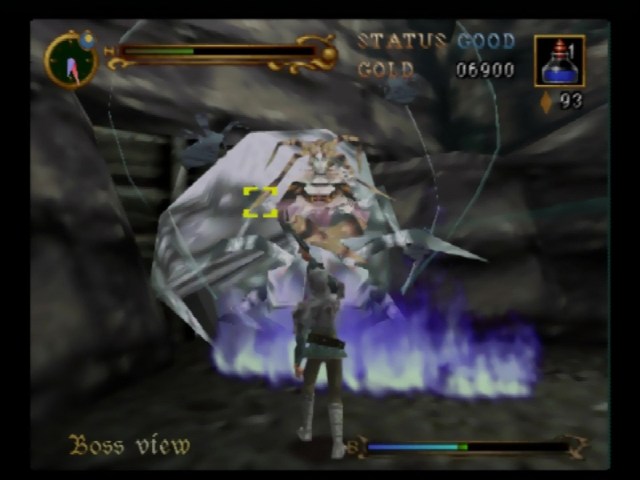
Moonwalker
If you manage to save all the children before the deadline, you unlock Reinhardt and Carrie’s quests. These are mostly the same as they were in Castlevania 64, with some mild rejiggering. Enemies might move around, patterns change, and some levels receive updates. Most notably, the game remixes later levels. I wouldn’t necessarily say they’re “better,” but they’re definitely different.
The gameplay itself has been largely unchanged. It’s really just smaller tweaks, both visually and in design. This is the first time I’ve played the two N64 titles back to back, and I previously thought Legacy of Darkness had more quality-of-life improvements. That really seems not to be the case. If you weren’t a fan of that sequence where you need to transport the magical nitro without exploding, then I’ve got bad news for you. It made its way to this title.
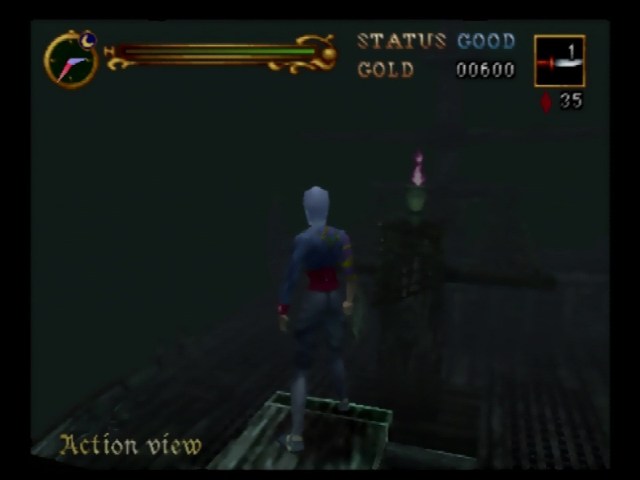
Polygonal peril
On the other hand, playing through the game a few more times has led to a greater appreciation for it. It confirmed to me that their greatest issues are mostly due to the era of design it came out in. At its core, it has a lot of strengths. There’s a decent amount of variety, as it frequently switches between combat, platforming, and puzzle-solving. Most 3D Castlevanias after this don’t switch things up with the same frequency, and I find them quite dull.
Castlevania: Legacy of Darkness just has a lot more life to it than many games across the series. I feel like Konami Computer Entertainment Kobe got a bit of a bad rap. Their contributions to the Castlevania series (which includes Circle of the Moon for GBA) and the Ganbare Goemon series tend to have a bad reputation. Koji Igarashi was rather quick to eject the N64 Castlevania titles (and Circle of the Moon for that matter) from the series canon after he took the helm, for example. Despite this, Cornell appears in the spin-off Castlevania Judgment on Wii, so who even knows anymore?
Yet, I’ve grown to really appreciate the developer’s work through Legacy of Darkness. It’s probably way past time for me to check out their Ganbare Goemon games. You can sense the passion from the team that harkens back to Konami’s glorious Famicom days.
Despite that, Castlevania: Legacy of Darkness is a hard game to recommend. That’s largely because the early 3D era of video games has aged poorly. However, if you’re like me and are largely immune to the jank that came from a generation of developers learning how to work around an entirely new axis, then yeah, I totally think you should check out Castlevania: Legacy of Darkness. Better yet, if you’re a fan of the console, this is one title that absolutely nails the feel and aesthetics. It almost completely renders Castlevania 64 obsolete, being the more definitive experience of the infamous titles.
